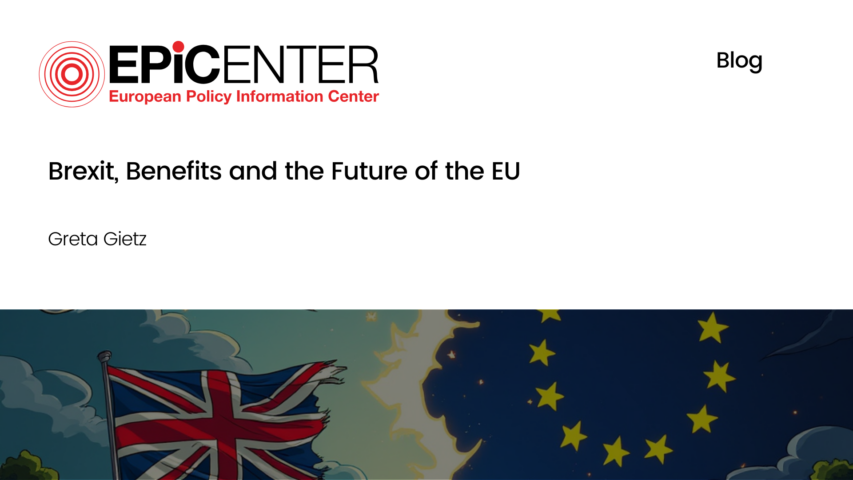Brexit, Benefits and the Future of the EU

Brexit, Benefits and the Future of the EU
Greta Gietz // 15.12.2015
The European Union has had a challenging year. The Euro crisis, the influx of immigrants through Turkey and the Mediterranean and growing concern about the Islamic State infiltrating Europe have, at various stages, thrown into question some of the pillars of European integration. As we near the end of 2015, open borders and the free movement of people are questioned and threatened. In the midst of this, the British referendum on membership and the prospect of a ‘Brexit’ have gained momentum and significance.
Since Great Britain joined the EU in 1973, it has renegotiated its membership terms on several occasions, obtaining a special status not granted to other Member States. Margaret Thatcher won the British rebate in 1984, by which approximately two thirds of Britain’s contribution to the EU budget that exceeds EU expenditure is returned each year, increasing contributions from other Member States. It opted out of monetary union and the social policy chapter signed at the Maastricht Treaty in 1991, and of the Schengen Agreement in 1997.
Following this tradition and in his efforts to avoid a British departure, David Cameron has requested a number of concessions from other Member States which, according to some, would violate Europe’s fundamental principles of non-discrimination (Protocol 12 to the European Convention on Human Rights) and the free movement of people (Article 21 of the Treaty of the Functioning of the European Union). In a bid to assuage concerns about the economic impact of EU migrants, Cameron wants to scrap welfare benefits for Europeans working in Britain for the first four years. His proposal seeks to prevent immigrants from becoming a strain on the British welfare state.
While such concerns are very prominent in the media and public debates, there is in fact little reason to believe EU migrants pose a challenge to public services. In Britain, as in other European countries, the welfare state is not threatened by immigrants, but rather by rapidly ageing populations who rely on state pensions and healthcare. Immigrants from the EU are primarily young, able-bodied additions to the workforce, most of whom are paying taxes to help fund the welfare state and so likely to pay much more into the system than benefitting from it. In fact, labour participation among EU immigrants is noticeably higher than for natives, about 5 per cent higher in 2011 for EEA immigrants and 11 per cent higher for recent immigrants from the A10 countries in Eastern Europe that have joined the EU since 2004. Many EEA immigrants bring with them high educational qualifications. In 2011, only 21 per cent of EEA and 8 per cent of recent A10 immigrants had a low level of education in contrast to 53 per cent of the native population.
Research by Christian Dustmann from UCL and Tommaso Frattini from the University of Milan (2014) shows that immigrants from the European Economic Area (EEA) made a positive contribution to Britain’s public finances in the years between 1995 and 2011, i.e. that they paid more in taxes than they received in benefits. This was especially true of immigrants who arrived in the years after 2000. Especially significant is the strong positive impact of about £5bn by immigrants from the A10 countries. The net fiscal contribution of immigrants from the rest of the EU during the same period added up to £15bn. Their fiscal payments were about 64 per cent higher than the services they used. Interestingly, non-EU immigrants only paid 3 per cent more in taxes than they used in benefits during this time. Overall, the total positive net contribution of all immigration to the UK between 2001 and 2011 was £25bn, while native Britons had an overall negative net contribution of £616.5bn and the UK ran a budget deficit. Indeed, contrary to their usual characterisation as benefits scroungers, recent migrants tend to be working age men and are 43 per cent less likely to receive benefits or tax credits than Britons. The evidence suggests that, among all migrants, EU arrivals are the bigger contributors to UK public finances.
Cameron’s request could lead to a change in EU treaties, whereby Britain and other Member States would be allowed to temporarily adopt measures restricting immigration if proven that public services, such as health care centres and schools, are overwhelmed by migration influxes (a so-called ‘emergency brake’). As the free movement of people is and has been a pillar of European integration, this would certainly mark a break in the European Union’s political and economic development.
Cameron’s proposal on welfare restrictions is continuing Britain’s history of determining its own arrangements in an à la carte fashion. As countries within the Eurozone proceed with further economic and political integration, the prospective renegotiations regarding British membership could set a trend for other EU Member States not currently in the single-currency area to do the same. This will likely lead to different levels of membership, a two-tier (or multi-tier) union. There is much to be gained from a Union that becomes more flexible and adapted to the needs and preferences of its different Member States – so long as reforms are consistent with the fundamental freedoms of EU citizens to trade and move freely – without detriment to the core countries wishing to pursue further integration.
EPICENTER publications and contributions from our member think tanks are designed to promote the discussion of economic issues and the role of markets in solving economic and social problems. As with all EPICENTER publications, the views expressed here are those of the author and not EPICENTER or its member think tanks (which have no corporate view).



